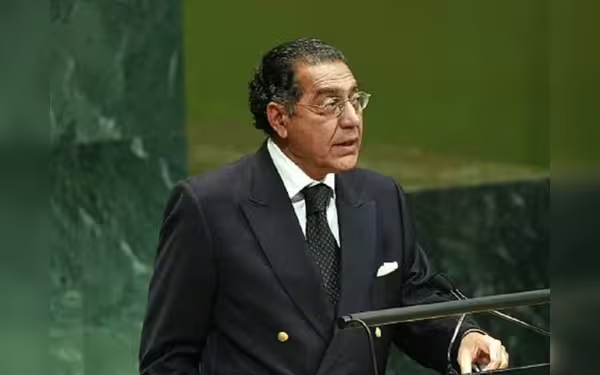Saturday, November 16, 2024 05:33 PM
UN Pact Criticized by Pakistan for Inadequacies in Global Disputes
- Ambassador Akram calls pact 'severely deficient'.
- Group of 16 nations demand comprehensive solutions.
- Transnational crime hinders development and SDGs.
 Image Credits: dailytimes_pk
Image Credits: dailytimes_pkPakistan's Ambassador criticizes the UN's 'Pact for the Future' for failing to address global conflicts and injustices.
The recent discussions at the UN General Assembly have brought to light significant concerns regarding the effectiveness of the "Pact for the Future," a framework adopted by world leaders last month. This pact, intended to address global disputes and conflicts, has been criticized as "severely deficient" by Ambassador Munir Akram, a senior diplomat from Pakistan. He emphasized that the pact fails to adequately tackle pressing issues such as the ongoing conflicts in the Middle East, particularly the war in Gaza, and various disputes in South Asia, Europe, and Africa.
During a debate at the assembly, Ambassador Akram pointed out that the pact does not address critical matters like the breakdown of arms control measures or the escalating global arms race. He urged the UN's relevant institutions, including the Security Council and the General Assembly, to confront these realities rather than avoid them. The ambassador also highlighted the need for addressing historical injustices faced by developing countries, asserting that the UN's security architecture should not be blamed for the failure to promote peace.
Ambassador Akram's remarks reflect a broader sentiment among a group of 16 like-minded nations, which includes Algeria, China, and Russia, among others. This group expressed disappointment that the pact does not mention essential principles such as sovereign equality and the right to self-determination. They also criticized the pact for not adequately addressing the root causes of global conflicts, including violations of international law and geopolitical tensions.
Furthermore, the group underscored the urgent need for a comprehensive solution to the debt crisis affecting many developing nations, emphasizing that the UN must play a central role in this process. The ambassador from Pakistan also called for a holistic approach to combat transnational organized crime, which he noted continues to hinder economic development and the achievement of the Sustainable Development Goals (SDGs).
In a related discussion, Ambassador Usman Iqbal Jadoon, Pakistan's deputy permanent representative to the UN, highlighted the challenges posed by transnational organized crime, including money laundering and cybercrime. He pointed out that climate change has created new opportunities for criminal groups to exploit vulnerable populations, further complicating the global landscape.
As the world grapples with these pressing issues, it is clear that the "Pact for the Future" needs significant revisions to effectively address the complexities of global disputes and conflicts. The call for reform and a more inclusive approach to international relations is not just a matter of policy; it is essential for fostering a more peaceful and equitable world. The discussions at the UN serve as a reminder that while agreements are important, the real challenge lies in their implementation and the commitment of nations to uphold the principles of justice and equality for all.













